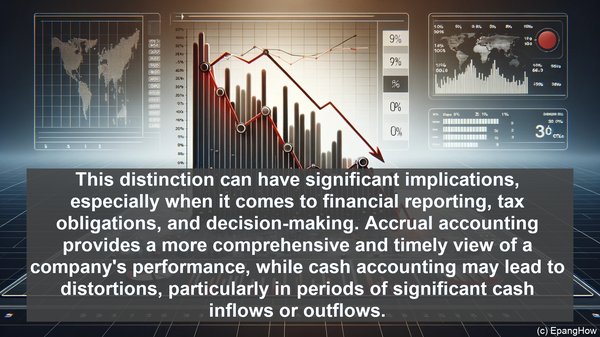Introduction: The Foundation of Accounting
Before we dive into the differences between accrual accounting and cash accounting, let’s establish a basic understanding of accounting itself. At its core, accounting is the process of recording, summarizing, and analyzing financial transactions. This information is crucial for decision-making, financial reporting, and compliance purposes. Now, let’s explore the two main approaches to accounting.
Accrual Accounting: Recognizing Revenue and Expenses
Accrual accounting is based on the accrual principle, which states that revenue and expenses should be recognized when they are earned or incurred, regardless of when the cash is received or paid. In other words, it focuses on the economic substance of a transaction rather than the actual flow of cash. This method provides a more accurate picture of a company’s financial health, as it reflects the current state of its obligations and future cash flows.
Cash Accounting: Emphasizing Cash Inflows and Outflows
Unlike accrual accounting, cash accounting follows the cash principle. It recognizes revenue when cash is received and expenses when cash is paid. This method is simpler and more straightforward, making it popular among small businesses and individuals. However, it may not provide an accurate representation of a company’s financial position, especially if there are significant time lags between transactions and cash movements.
Key Differences: Timing and Accuracy
The primary difference between accrual accounting and cash accounting lies in the timing of revenue and expense recognition. While accrual accounting focuses on the moment of earning or incurring, cash accounting centers around the actual cash flow. This distinction can have significant implications, especially when it comes to financial reporting, tax obligations, and decision-making. Accrual accounting provides a more comprehensive and timely view of a company’s performance, while cash accounting may lead to distortions, particularly in periods of significant cash inflows or outflows.
Financial Statements: Reflecting the Accounting Method
The choice between accrual accounting and cash accounting has a direct impact on a company’s financial statements. For example, the income statement prepared under accrual accounting reflects the revenue and expenses incurred during a specific period, regardless of when the cash is received or paid. On the other hand, the income statement under cash accounting only includes the cash transactions within that period. Similarly, the balance sheet and cash flow statement differ in their presentation, depending on the chosen accounting method.

Legal and Regulatory Requirements
In many jurisdictions, the choice of accounting method is not entirely discretionary. Larger companies, public entities, and those with external investors often have to adhere to accrual accounting principles for financial reporting purposes. This ensures consistency, comparability, and transparency in financial statements. However, for tax purposes, some jurisdictions may allow or even mandate the use of cash accounting, particularly for smaller businesses.

